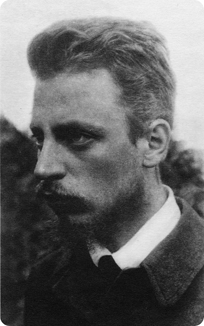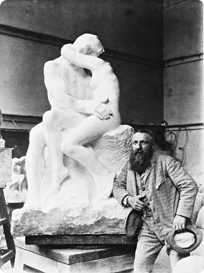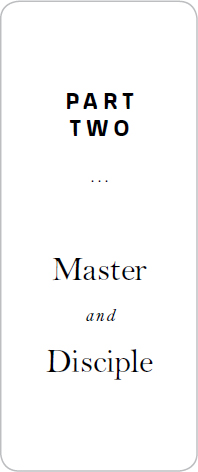Read You Must Change Your Life Online
Authors: Rachel Corbett
You Must Change Your Life (12 page)
Rilke's wife Clara Westhoff with their daughter Ruth
.
Meanwhile, art exhibitions he had organized in Vienna and Berlin fell through. Publishers passed on his book proposals and newspaper editors had been rejecting his applications for art critic positions. He thought he might eventually be able to cobble together enough assorted university credits to eventually earn a doctorate degree, but that, too, would require money he did not have.
Rilke's father offered to help him get a job at a bank in Prague, but the poet only replied that the suggestion made him physically sick. It would mean giving up all he had struggled for and going back to the very thing he had fled. It would be “a frost, in which everything would have to die.” He knew his father meant well, but why couldn't he understand that this profession would destroy his art? Why did art have to be seen as arrogance? To Rilke, art was his duty, no less compulsory
than some treated military service. Rilke decided he would rather starve, and let his family starve, than work as a bank clerk. That fate “would be like death without the grandeur of death.”
Finally, in the spring of 1902, the German publisher Richard Muther told Rilke about his series of artist monographs which would include volumes on Manet by Julius Meier-Graefe and on Leonardo da Vinci by Muther himself. He knew Rilke had just finished the Worpswede monograph and suggested the poet write one on Rodin. The pay was a paltry 150 marks, but Rilke desperately needed the money and accepted the offer on the spot. Privately, he also saw it as a way out of the house and out from under the oppressive routines of domesticity. He longed “to feel, to be, real among real things” like he had been before his marriage. If he went to Paris, he would be able “to work in the libraries, to collect myself, and to write about Rodin whom I have loved and revered for a long time.”
Rilke's decision to leave town just a few months after having a baby struck some as unforgivably selfish. “How appalling: first marry and have a child, and then think about how to earn a living,” wrote Modersohn in his journal. But Westhoff could not have objected too strongly because she used her connection as a former student of Rodin to facilitate an introduction. She sent the sculptor a letter including some images of her work as a reminder. At first, no response came. As it happened, Rodin was in Prague at the time, attending one of the largest surveys of his work ever staged. After that, Rodin traveled to Vienna to see the Secession Exhibition and visit with Gustav Klimt, who had just debuted his monumental
Beethoven Frieze
there. When Rodin saw the painting in person, he took Klimt's hand in his and said, “What an artist you are! You understand your
métier
.”
After Rodin's return to Paris in June, Rilke followed up with another letter to say that he would like to come to the city that fall to research a monograph on him. He also implored the artist to respond with even “a single word” for Westhoff, who waited anxiously for the master's acknowledgment.
Fortunately for Rilke, Rodin was a devoted bibliophile. He had
sculpted dozens of works inspired by literature and, in turn, authors had been among his biggest supporters. Rodin was thought to be so influenced by writers and critics that he routinely made adjustments to his work in order to conform to their reviews. At the very least, Rodin had nothing to lose by granting access to this enthusiastic young writer. He responded warmly, but briefly, to say that he remembered Westhoff as a capable and imaginative sculptor, and that he would be happy to receive Rilke for his research. Rodin would be available in Paris in September or November should he like to visit then.
Rilke wrote back in August that he would arrive the following month. He again made a push for his wife, asking if the master might also be willing to critique some of her sketches in person if she came along. Then he spent the rest of the summer studying and becoming “utterly absorbed” in Rodin's work. He was “growing and growing for me the more I hear and see of his works. Does anyone exist, I wonder, who is as great as he and yet is still living,” Rilke wondered. The expressive intensity of Rodin's work held a natural appeal for the young romantic. The physical strain of
The Thinker
's ruminations seemed to materialize a state of mind, while the embracing marble lovers of
The Kiss
embodied concentrated emotion.
In life, Rilke admired Rodin's compulsive devotion to his craft: he sacrificed luxury and material pleasures for the preeminence of his art, which he valued more highly than gold or bread. He was known for living humbly and spending all of his time at work, in the company of his creations rather than friends or family. Rodin was one for whom “the whole sky was but a stone,” as Rilke once wrote. This ascetic covenant resonated with the poet, who believed that deprivation leavened the soul.
It occurred to him that perhaps Rodin would be the master for whom he had searched and failed to find in Russia. Rilke hinted at this hope in another letter to Rodin: “It is the most tragic fate of young people who sense that it will be impossible for them to live without being poets or painters or sculptors, that they do not find true counsel, all plunged in an abyss of forsakenness as they are; for in seeking a powerful master,
they seek neither words, nor information: they ask for an example, a fervent heart, hands that make greatness. It is for you that they ask.”
IN AUGUST 1902
, the poet folded his clothes and arranged them into an immaculate constellation in his suitcase. He was preparing to leave behind his wife and baby to embark on a quest not merely to write, but to understand how an artist should be.
Rodin could not have imagined the magnitude of the poet's devotion to the cause, which was of almost biblical proportions. Rilke would worship the sculptor's art as if it were a religion, and Rodin himself as a savior. Like Joshua following Moses to the Promised Land, Rilke saw this journey as the beginning of a new future. Everything in his life felt uncertain except for this.
CHAPTER
6

R
ILKE ARRIVED AT PARIS'S GARE DU NORD RAILWAY STATION
on a steamy August afternoon. Travelers were advised to immediately entrust their belongings to a porter to avoid thieves and pickpockets who preyed upon tourists bewildered by the crowds at the enormous glass station.
As he stepped out into the street, his shirt buttoned to the top and trousers creased, Rilke's eyes bulged at the sight of this alien city. He had never seen an industrialized metropolis like this beforeâthe motors, the speeds, the shapeless enormity of the crowds. Machine-powered labor had replaced human jobs and pushed many of the disenfranchised workers into the streets. He spotted disease-ravaged bodies split open with abscesses, trees scorched bare by the sun, beggars with eyes “drying up like puddles.” There were hospitals everywhere.
The crowds of people reminded him of beetles, crawling through garbage, scurrying to survive beneath the giant footsteps of life. Before the advent of big cities and public transportation, one rarely had to look at other people. Here they were everywhere, forming masses that seemed to contain no individual faces, only needs.
The visual field corresponded with the economic spectrum, so that in a single pan of the eye one saw the full gamut of the city's wealth
and poverty. At the bottom were the ragpickers fashioning shantytowns out of the waste of the bourgeoisie, whose carriage horses trotted overhead, leaving trails of litter and horse manure behind them. Somewhere in the middle were the dogs, often quicker than the beggars at snatching up scraps of food.
Parisians seemed to feel the will to live more keenly than others. Rushing commuters “made no detour around me but ran over me full of contempt,” as if Rilke were a pothole in the street, he wrote. The newfangled subways and streetcars, meanwhile, sped “right through me.” It soon became clear that no one would stop to help him here. Unlike in Munich, they did not care that he was a young, struggling artist. Everyone was struggling here just to survive.

Rilke shortly before he met Rodin
.
But as Rilke hopped over heaps of trash on the way to his hostel, he began to feel terribly excited. The sights were all so newâthe bridges, the wagons, the brick streetsâthat it felt as if they had been made for his eyes alone, like the set of a play to which no one else paid attention. He pronounced the foreign street names to himself and let the rhythmic French syllables loop around his head:
André Chénier
,
vergers
. . . Paris was filthy, yes, but at least this was the filth of Baudelaire and Hugo, he thought.
By the time Rilke crossed the Seine to reach the Latin Quarter he felt feasted upon and exhausted. The neighborhood had since lost its bohemian reputation as artists began climbing the hill to Montmartre, where they squatted in
maquis
or moved into the fabled Bateau-Lavoir studio building, as Picasso and Kees van Dongen would soon do. Now the quarter was dominated by students from the Sorbonne, just down the street from Rilke's hostel on the narrow Rue Toullier.
Opening the door to his cramped room gave him little comfort. There was an armchair indented by all the greasy heads that had previously rested on it, a threadbare rug and a pail with an apple core left in it. A single window looked out onto a stone wall, a view that Rilke would accuse of stifling his breathing over the next five weeks. Worse, the dozen windows on the building seemed to stare back through his curtains, watching him “like eyes.”
He lined up his pens and papers into orderly rows on the desk and lit the wick of a kerosene lamp. He sat down to reflect on his journey thus far, leaning back into the hollow of the chair, already molded into the slumped shape of a weary traveler.
AT JUST BEFORE
three o'clock on Monday, September 1, Rilke walked from his hostel along the Seine to Rodin's studio in the Marble Depot to introduce himself to his future master. The courtyard of the building looked as rough and undeveloped as a quarry, with sheds lined around the edges for studios. Sometimes a sign hung on the door to Atelier J informing visitors, “The sculptor is in the Cathedrals.”
Luckily that was not the case on the day that Rilke knocked. The door opened onto a dark room, “sparsely filled with gray and dust,” he noticed. There were a few bins of clay and a pedestal. Rodin had cropped hair and a soft gray beard. He stood scraping at a chunk of plaster in his hand, paying no attention to a model posed nude before him. His clothes were hardened with the splatter of earthy pastes. He was shorter than Rilke expected, yet somehow more noble-looking. A
pair of rimless glasses balanced on his nose, which extended from his forehead like a “ship out of a harbor,” Rilke observed.


